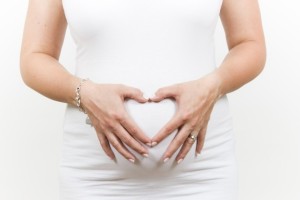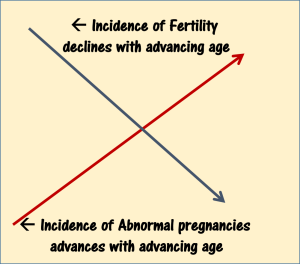Commonest comment from GenNext girls/ couples, “I don’t think I am ready yet”; Commonest request from parents and in-laws after a marriage (most likely in early 30s), “It’s time you thought of starting a family”; Commonest reason for delaying the attempt, “career, money & ‘I need to enjoy wedding bliss’!.
Well it is not something you can get from one of the e-retail platform when you wish! No one ever gives a thought to when is the human body MOST READY to conceive and produce a healthy baby? Hence the need to discuss the topic in detail because our experience in day-to-day practice has shown us despite super IQs, smartphones, tabs and several search engines, misconceptions abound.
A female infant is born with millions of eggs. Only about 300,000 are viable at the time of puberty. At any time the eggs are as old as her calendar age. Younger, she is likely to be much healthier and similarly younger eggs are much more healthier.
At puberty a female starts her menstrual cycle which means her reproductive system is mature & ready to procreate. Pubertal age has come down to 10 to 11 yrs. But it does not mean she is ready for procreation.
Optimal age of fertility begins at 18 and starts to decline at the age of 30.
Conception in the early years of this fertile period is not recommended as in the later years.
So what is the right age? It is the most fertile period when chances of conception are higher & complications of pregnancy are low.
In the teens (though in the fertile bracket), the female reproductive system is not still regularised.
It has been found that early 20-24 yrs is the most fertile and safe period. Chances of conception is 20% in every month of unprotected REGULAR sexual contact or coitus (after all, coitus ONLY during 4-5 days of the 30 day regular cycle can be productive). Of the percentage of women who conceive, the miscarriage rate during these years is about 9.5 percent only and increases further in the early 30s to 11.7. Of the pregnancies in 40s, more than half the pregnancies end in miscarriages/ defects in foetus.
By the age 30, 7% of couples may be infertile since 90% of their egg reserve is depleted; and beyond 35, 11% of couples may be infertile; by age 40, this rises to 33% and at age 45 it is a whopping 87%!
Due to several reasons, which we will not discuss here as each couple has their own justification, the average age at first pregnancy is on the rise and this delay is causing women to try conceiving at a time when fertility is on the decline (akin to take CAT at 45; some may succeed, most won’t). And the couple who are, most likely, higher up in the corporate hierarchy go through debilitating stress – how can ‘I’ not conceive, when ‘I’ feel ‘I’ should conceive?
In the teen age group when conception is least expected early pregnancy is missed out. So vitamins & other nutrients, which are crucial for the healthy nervous system in the 1st trimester are invariably not taken. Acceptance of pregnancy both by the woman concerned as well as her parents & elders is unlikely to happen leading to deficiency in pregnancy care hence low birth weight of the new born, miscarriages and congenital anomalies.
20-24 yrs is most fertile period advantage being, the egg is younger; uterus is healthy to receive & embed the egg. The hormone levels are good to keep the pregnancy going. Having a resilient body with enough energy not only helps to manage millions of chores of bringing up a child but also helps remain active during the day subsequent to sleepless nights. Also, high blood pressure, diabetes in & due to pregnancy, ectopic pregnancies, low birth weight &/or premature birth and C-sections are less likely in this age slot. Further women find it easier bouncing back their pre-pregnancy body when in their 20s.
A pregnancy when woman is younger, not only has lower incidence of birth defect such as Down syndrome (1 in 1,667 births among women age 20) or other chromosomal abnormalities (1 in 526 among women age 20) but also it helps lower her lifetime breast cancer risk.
But today higher education, being job & career oriented, being newly (JUST) married and body image all prevent her from conceiving.
Early pregnancy is advantageous on a physical note, but financially one may not be stable and may have fewer resources and may not be mature enough to handle parenthood & have less experience/ no support system (relocated overseas). One fears losing out on friends, partying, movies etc; but you can write down all the things you miss and slowly & in an innovate way, get them back to in life. After all GenNext is adept at creating ‘task’ lists and accomplishing closure.
If pregnancy eludes you, inspite of a year of having unprotected and regular sex, two or three times a week, you need to see your doctor (NCCWCH 2013:6).
Infertility is 7-9% in the late 20s category & the miscarriage risk increases to 10 from 9 though conceiving in this age is common. Chromosomal anomalies are 1 in 400 & 1 in 1000 risk of Down’s Syndrome until the age of 30.
In your late 20s you’re more likely to be better established in your work life and, your relationship with your husband may also much more stable to handle the changes that parenthood brings. Since maturity is more you may not be ashamed of your baby bump, and may be able to handle relationships at home & balance home & work well and manage the stress associated with a baby in a balanced state. You are also more likely to be at optimal fitness, making delivery and post-delivery weight loss easier. In terms of long-term health, if you begin conceiving in your 20s, you may be at decreased risk for breast cancer and ovarian cancer, according to some studies.
Fertility declines after 30, 90% 0f the eggs are depleted by then. Moreover C-sections rates are double after 30 than in 20s. Success rates of IVF (test tube baby) and other assisted reproduction techniques are 25 to 28% in the 30s but only 6-8% in the 40s. The miscarriage rate is 11.7 % and the risk of having a baby with Down syndrome is 1 in 952, and a baby with any chromosomal abnormality is 1 in 385.
Beyond 35, this is the age when your doctor might recommend amniocentesis or some other prenatal screening—which for most women is anxiety-provoking while they await results—because the risks of having a baby with Down syndrome or another type of chromosomal disorder begin to rise significantly.
Fertility continues to decline after age 35, and it takes a nosedive at age 38.
Up until age 35, most doctors suggest that couples have unprotected intercourse for a full year before seeking infertility treatment; that time period is reduced to six months for women over 35. And anxiety over not conceiving may reduce it further.
There’s a big difference in success rates between a woman in her late 30s and one in her early 40s. Earlier the better.
The risk of high blood pressure during pregnancy is about double for women over 35 compared. Gestational (pregnancy) diabetes is two to three times more common in this age group and the risk is even higher if the woman has gained weight over the years. Furthermore, 50% of women who develop pregnancy diabetes will have diabetes in later life! Risk of C-Section is also on the high.
The chance of having multiple births, especially twins and even triplets, increases significantly in your late 30s (and early 40s), because of drug induced ovulation.
The miscarriage rate rises to close to 18%. Rates of stillbirths are about twice as high as in younger ones, according to recent studies, although the reasons are unknown.
Technology to aid conception is much less successful as women age. Only 10% of women aged 40 will have a successful pregnancy with a single attempt through IVF.
To conclude…
With all the newer techniques pregnancy at any age can be medically managed. But finally everything depends on the woman’s health, energy, personality, maturity level and perspective on life. Some women are born with more eggs – such women will menopause late (beyond 50yrs); others with lesser functional eggs (PCOD). Stopping to smoke, reducing stress, keeping weight in check can also prolong fertility and give success rates in assisted conception. While we can’t change our age, there are proactive steps we can take to boost our odds of enjoying a happy and healthy experience; no matter whatever the age!
Woman’s ovarian reserve, follicular dynamics and associated biomarkers can give an idea about future chances of pregnancy for that individual, facilitating an informed choice of when to have children. Yet it is important to know time does matter as far as pregnancy is concerned
Dr Suman Rao with Dr C H Asrani and a team having collective experience of fitness, nutrition and fertility counsel/ consult for any doubts, concerns, fears that you may have!
Write to: drchasrani@cmhs.in






Thanks for your knowledge you share with Ma’am.This will definitely help younger generation for there future plans.
Thank you.